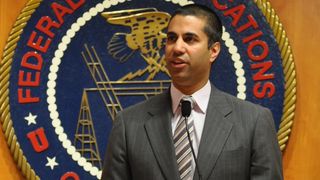Pai Slams California Net Neutrality Bill

Calling it the most egregious example of state efforts to regulate the internet, FCC chair Ajit Pai took aim at a new California law the rolls back his net neutrality deregulation.
In a speech at the Maine Heritage Policy Center, Pai called the new law, which restores rules against blocking, throttling and paid prioritization and applies them to interconnections, a radical, anti-consumer effort to reimpose burdensome restrictions and said the FCC would defend its deregulation.
"[L]et me be clear: The Internet should be run by engineers, entrepreneurs, and technologists, not lawyers, bureaucrats, and politicians," he said. "That’s what we decided in 2017, and we’re going to fight to make sure it stays that way."
The center is a limited government group aligned with Pai's deregulatory approach to the 'net.
Pai mocked the California effort, evoking the state's regulating the ready availability of single-use plastic straws in restaurants. "In a way, I can understand how they succumbed to the temptation to regulate," he said. "After all, I suppose a broadband pipe might look to some like a plastic straw."
Pai said the law would bar consumers from many free data plans that allow them to stream video and other content for free. He suggested that would hurt lower-income residents with whom such plans are particularly popular. Critics say the plans are a form of discrimination since they allow content providers to pay for a distribution advantage over others.
"[N]anny-state California legislators apparently want to ban their constituents from having this choice. They have met the enemy, and it is free data," he said.
Broadcasting & Cable Newsletter
The smarter way to stay on top of broadcasting and cable industry. Sign up below
Pai pledged to fight the state's "micromanagement" which he said poses a risk to the rest of the country since broadband is an interstate service and does not "recognize" state lines.
The FCC's 2017 network neutrality deregulatory order makes clear that it preempts state efforts to reimpose the regs. Pai pointed out the that Eighth Circuit Court of Appeals recently reaffirmed that state regulation of information services is preempted by federal law--the Restoring Internet Freedom order also reclassified internet access from a telecom to an information service.
The broader problem is that California’s micromanagement poses a risk to the rest of the country. After all, broadband is an interstate service; Internet traffic doesn’t recognize state lines. It follows that only the federal government can set regulatory policy in this area. For if individual states like California regulate the Internet, this will directly impact citizens in other states.
Contributing editor John Eggerton has been an editor and/or writer on media regulation, legislation and policy for over four decades, including covering the FCC, FTC, Congress, the major media trade associations, and the federal courts. In addition to Multichannel News and Broadcasting + Cable, his work has appeared in Radio World, TV Technology, TV Fax, This Week in Consumer Electronics, Variety and the Encyclopedia Britannica.

